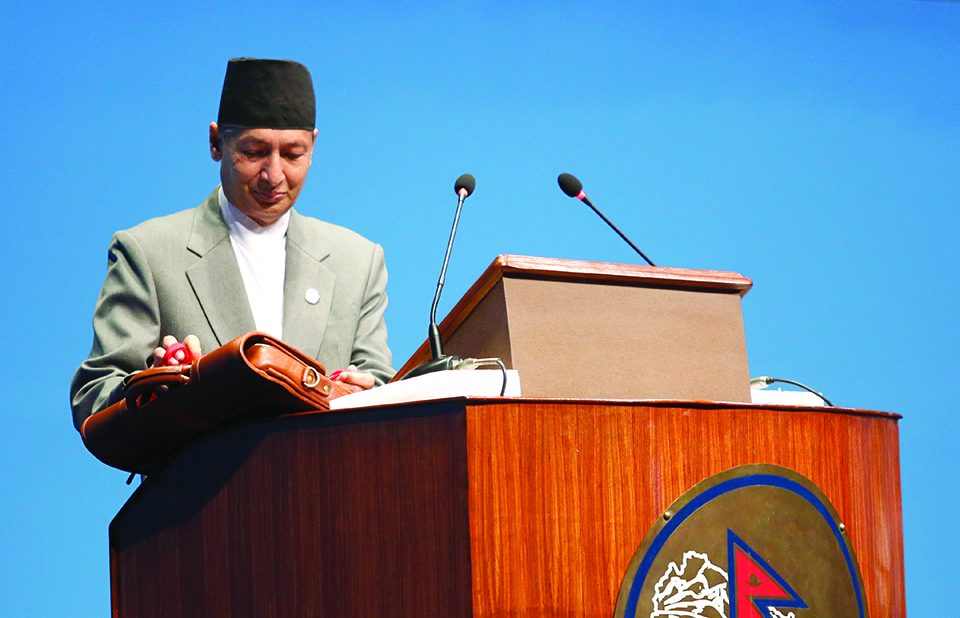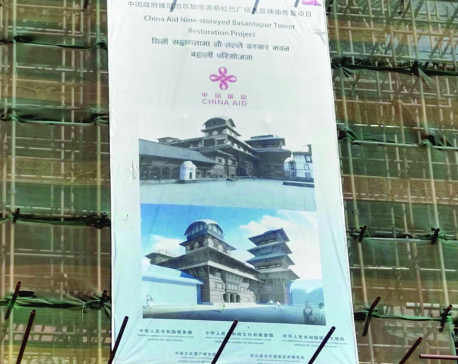
OR

More from Author
The well-known economist was expected to take drastic measures to rejuvenate the country’s economy but this has not happened under his leadership
In March 2018, when Prime Minister KP Oli appointed well-known technocrat Dr Yubaraj Khatiwada as Finance Minister of his cabinet, there was a hope that Nepal’s economy would move toward third generation reform. Though Khatiwada’s appointment came as a shock to the political fraternity within Nepal Communist Party (NCP), former head of central bank and two times Vice-Chairman of the National Planning Commission (NPC), he was praised by many and expected to drive the country toward prosperity and correct riddled economy that was waiting for reform for a long time. He was seen as a trusted figure to implement Prime Minister’s vision of ‘Prosperous Nepal, Happy Nepali.’ Those expectations were justified for Khatiwada was the main architect of widely ambitious election manifesto of the Left Alliance.
Soon after taking office Khatiwada diagnosed Nepal’s economic ills and presented his preliminary report as the white paper. To everyone’s surprise, the paper presented a pessimistic picture. It stated that the current fiscal budget has not incorporated projects that were given resource assurance by previous budgets. The paper stated that the government will face a budget deficit. In the white paper, he was basically blaming the previous governments for all ills.
But on May 29, when Khatiwada presented his first budget setting eight percent GDP growth target, expecting economy to grow by 5.9 percent and keeping the inflation target at 6.5 percent, it received criticism within his party. The government did not bring the programs as promised.
Expectations and realities
It was expected that he would revise Nepal’s liberalization process giving the state more power and driving the country toward reform. As a minister of a communist government, he was expected to push forward state centric role to regulate free market. But nothing of that sort is happening at the moment. Instead, private sector is scared to make any move and is skeptic of him. He’s seen as someone who is not so open to criticism and hostile toward private sector.
He has been saying that Nepal is on its way to become a welfare state. This has made investors skeptic about investing in Nepal, speculating state control over business. Many feared finance minister’s regulatory approach might negatively affect real estate and capital markets. Their fears have come true.
Currently none of the economic indicators looks good. The trade deficit has hit an all-time high and there’s no sign of foreign direct investment flowing in the country. Investment for the first quarter is less than 37 percent than in previous years. Nepal has slipped five points down in Doing Business Index. Rather than bringing measures to correct the situation, he is criticizing the World Bank reports. Investors are looking for policy assurance to safeguard their investment but his ministry has not been able to do that. The recent macroeconomic update says current account is in deficit by 2.73 percent of the GDP. There has been no initiative to correct low capital expenditure. The government is not regulating the sector which needs to be regulated.
Losing focus
Finance Minister seems disoriented. He’s seen wielding a considerable amount of influence over the central bank. While he was the governor of Nepal Rastra Bank, he opposed the Finance Ministry controlling and influencing central monetary authority. Now he himself seems to be doing the same. This is ironical because the country’s financial system has already started to feel the heat of an impending liquidity crisis. The government has failed, first to understand that, given the political stability, the demand for bank credit by the private sector would substantially increase and, second, to manage additional or alternate sources of funds to meet these demands. It has put both corporate governance of financial system and government credibility at risks.
The widely-welcomed Social Security Scheme seems to lack clarity. The government is not yet able to take private sector into confidence to execute this scheme. Finance Minister has not made any statements regarding this. He has not been seen to contribute to strengthening federalism process. We don’t know when the much-needed Natural Resources and Fiscal Commission will become fully functional.
Finance Minister enjoys support from the prime minister. He has the opportunity to bring result-oriented changes in Nepal’s economy and make people feel the change but he has not taken any major steps for this. Financial indiscipline and irregularities have not been controlled. There have been no major policy changes and no initiative has been taken to normalize capital market, end liquidity crisis and encourage the public sector to become part of economic reform process.
The government lacks a focused approach on seeking cooperation from donor agencies and development partners. Changing statements and positions of the Prime Minister and his finance minister on various issues have confused the donors.
The well-known economist was expected to take some drastic measures to rejuvenate the economy, restrict capital flow into the real estate market, make economic reforms and direct the country toward economic stability. This has not happened under his leadership. He was expected to bring targeted program and policies to attract investment. But he looks lost in his ideology.
Ten months might not be enough time to judge the finance minister’s performance. But morning shows the day. Khatiwada hasn’t been able to generate hope of reviving Nepal’s economy.
The author is a student of economics at Tribhuvan University
Twitter: @neshaant
You May Like This

Power to youth
Grassroots level policy-making and activism can truly transform Nepali youth and Nepal ... Read More...

Justice in transition
What about probable international intervention mandated by the United Nations Security Council? The Hague is not the pie in the... Read More...

Alleyway to Beijing
Centralization of all authority in Baluwatar continues unchallenged. Federalism is slowly being turned into a farce. Fundamental freedoms are... Read More...





Just In
- NRB introduces cautiously flexible measures to address ongoing slowdown in various economic sectors
- Forced Covid-19 cremations: is it too late for redemption?
- NRB to provide collateral-free loans to foreign employment seekers
- NEB to publish Grade 12 results next week
- Body handover begins; Relatives remain dissatisfied with insurance, compensation amount
- NC defers its plan to join Koshi govt
- NRB to review microfinance loan interest rate
- 134 dead in floods and landslides since onset of monsoon this year













Leave A Comment